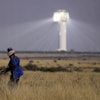LA PLATA, Md. (AP) - When the Morgantown Generating Plant was ordered along with six other coal-fired power plants to reduce pollutants, it quickly took action to comply. But the way it decided to do it has one community group worried about side effects.
Maryland enacted new clean-air regulations that required the plants to reduce discharges of sulfur dioxide and mercury. In response, the Morgantown plant's parent company, Mirant Corp., applied to the Maryland Public Service Commission to install wet scrubbers on its two new smokestacks.
Some residents, however, are concerned about large water vapor clouds the process will create. They are also concerned that the scrubbers will use so much water that it will reduce the region's supply.
''We're pleased that Mirant has responded so quickly to meeting the requirements of the Maryland Healthy Air Act,'' said Joe Martin of the Cobb Neck Citizens Alliance. ''But we're concerned that the technology they've chosen to use to reduce emissions is going to put a strain on water supplies and create a more visible pollution scar than needs to be.''
The cleaning technology will use an estimated 1.5 million gallons of water each day from new deep wells at the site. According to the Virginia Department of Environmental Quality, an average household uses about 200 gallons of water each day. That makes the Morgantown plant's potential daily use the same as 7,500 homes.
Martin, of the citizen's alliance, said the vapor plumes and impact on water supplies could be reduced by using dry scrubbers instead. Although they use less water, dry scrubbers are not as effective as wet scrubbers in reducing sulfur in power plants, according to the U.S. Environmental Protection Agency.
Misty Allen, external affairs manager of Atlanta-based Mirant's mid-Atlantic division, acknowledged that a vapor cloud is a byproduct of wet scrubbers. She said the company doesn't believe its water use will have a negative impact on the region.
She said the company will spend $1.5 billion to install wet scrubbers at three Maryland plants and expects it to reduce total emissions of sulfur dioxide and mercury by 95 percent.
''Use of wet-scrubber technology will allow us to meet the requirements of the law,'' she said.


















